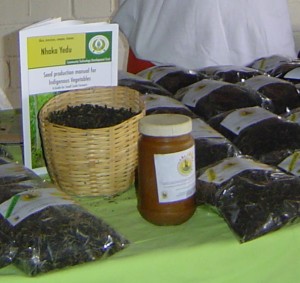Buy Zimbabwe campaign, a fabulous ill-timed event
Wednesday, July 20th, 2011 by Dydimus ZengeneneReading through The Zimbabwean as part of my daily morning dosage, the story of the Buy Zimbabwe Campaign by Ngoni Chanakira caught my eye. A ‘”Chief Executive’s Walk” across Harare to Africa Unity Square’ … the campaign is meant to encourage Zimbabweans to buy local goods as opposed to the cheap imports that currently flood the market. A noble idea, right? But this is utter hogwash.
The stupidity manifests from two angles. First, is it really feasible at this point to ask a Zimbabwean to stop buying imports, and second, who is doing the campaign?
If there are executives in the campaign I hope there is no one coming from the retail industry because all of what they are selling is mostly, if not all, imported goods. I am not even sure if there is any sector that has recovered enough to supply the market with at least half their demands. I wonder which Zimbabwean goods they would encourage us to by?
If Zimbabwean goods can be found their cost is far higher than the average worker’s pocket can afford. Media has been running awash with debates of pay increases for civil servants, which is now more of a political issue than life and death. Assuming that Gibbs Dube report has some elements of truth, it emerges that civil servants have had their salaries increased by about $90 or lets say $100 dollars to be polite. Now they earn within the region of $300. Given the high costs of rentals, utilities and food, how much will be left for the worker to buy expensive imported products. Yes as a worker, I want to promote my country, but where are the goods? The few products on the market are just too expensive to afford. We buy Chinese products, Japanese second hand cars and the like. But everyone knows that the Chinese products on the market are not as durable as we want. We just buy them as a matter of convenience or to at least keep ourselves going. We are desperately waiting for that day when our businesses are back to full swing. Unfortunately the day is taking forever to come.
It would be absurd for one to waste time and effort to search for a Japanese car on the Internet if a new car was reasonably affordable at Willowvale. The losses that local companies are making are not because people are not buying their products as such but mainly because they are not manufacturing enough, or that the spirit of over pricing products is still haunting them. It is true that the cost of production could still be too high for now, but it would not be possible to buy a shoe that costs half my salary simply because it has been manufactured in Zimbabwe. Yet Mr Jiang has a weak Beijing brand of the same shoe costing $5. I better buy 13 pairs of his shoes. Perhaps they might even last longer.
When executives march to encourage people to buy local goods, it’s not bad if they too sell local goods at a price that we can afford, or at least with the payment conditions that are flexible enough for the poor worker.
That brings me to the second point. Today these executives are blaming the end consumer for being unpatriotic. Are they not the same executives who tasted prisons for what we called unethical business practices which fueled inflation? I even remember Econet selling its 0913 sim card for a $100, which was unjustified profiteering. They now sell this product for $2. Are they not the same business people who trebled their prices whenever the worker got an increment? What it points to is the fact that we do not trust the business people any more or at least we were made not to. They do not happen to have the very same patriotism, which they want customers to have when it comes to buying their goods, do they? History shows otherwise. Responding to their call is like a group of sheep that responds positively to a jackal’s call for a meeting.
I encourage Mr. Muyaradzi Hwengwere to go ahead and organise a meeting of executives on the 3rd of August. It is allowed for executives to walk together, share ideas, and even bask in the Africa Unity Square sun, enjoying the green lawn and that flamboyant fountain if it is still works. However making noise about that event, claiming to be having a purpose of making us buy their local goods is just a fallacy. Discouraging the buying of foreign goods is not bad for an economy with some threads to function on its own. Our dear country heavily relies on imported products both directly or indirectly. Stuff as basic as food, soap etc are all imports. Of late there have been talks to ban second hand car imports from Japan. Do we ever bother to know how much ZIMRA is making out of that process? The popular toll gates are all harvesting from the cheap cars around here, and the poor transport system is being supplemented, illegally though, by those cars.
The Buy Zimbabwe Campaign is a brilliant idea at the wrong time by the wrong people.










